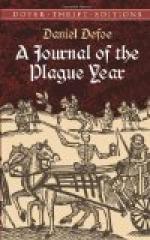[173] Old form for “rode.”
[174] See the last sentence of the next paragraph but one.
[175] Roadstead, an anchoring ground less sheltered than a harbor.
[176] Substitute “that they would not be visited.”
[177] The plague.
[178] St. Margaret’s.
[179] Nota bene, note well.
[180] Dul’ich. All these places are southward from London. Norwood is six miles distant.
[181] Old form of “dared.”
[182] Small vessels, generally schooner-rigged, used for carrying heavy freight on rivers and harbors.
[183] London Bridge.
[184] This incident is so overdone, that it fails to be pathetic, and rather excites our laughter.
[185] Supply “themselves.”
[186] Barnet was about eleven miles north-northwest of London.
[187] Holland and Belgium.
[188] See Luke xvii. 11-19.
[189] Well.
[190] With speed, in haste.
[191] This word is misplaced. It should go immediately before “to lodge.”
[192] Luck.
[193] Whom.
[194] A small sail set high upon the mast.
[195] “Fetched a long compass,” i.e., went by a circuitous route.
[196] The officers.
[197] Refused.
[198] Nearly twenty miles northeast of London.
[199] He. This pleonastic use of a conjunction with the relative is common among illiterate writers and speakers to-day.
[200] Waltham and Epping, towns two or three miles apart, at a distance of ten or twelve miles almost directly north of London.
[201] Pollard trees are trees cut back nearly to the trunk, and so caused to grow into a thick head (poll) of branches.
[202] Entertainment. In this sense, the plural, “quarters,” is the commoner form.
[203] Preparing.
[204] Peddlers.
[205] “Has been,” an atrocious solecism for “were.”
[206] To a miraculous extent.
[207] “Put to it,” i.e., hard pressed.
[208] There are numerous references in the Hebrew Scriptures to parched corn as an article of food (see, among others, Lev. xxiii. 14, Ruth ii. 14, 2 Sam. xvii. 28).
[209] Supply “(1).”
[210] Soon.
[211] Substitute “would.”
[212] Whom.
[213] Familiar intercourse.
[214] Evidently a repetition.
[215] “For that,” i.e., because.
[216] Singly.
[217] Supply “to be.”
[218] Buildings the rafters of which lean against or rest upon the outer wall of another building.
[219] Supply “of.”
[220] The plague.
[221] “Middling people,” i.e., people of the middle class.
[222] At the mouth of the Thames.
[223] Awnings.
[224] Two heavy timbers placed horizontally, the upper one of which can be raised. When lowered, it is held in place by a padlock. Notches in the timbers form holes, through which the prisoner’s legs are thrust, and held securely.




